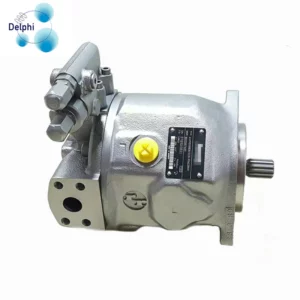The Parker PV080 piston pump is a high-pressure, variable displacement axial piston pump designed for industrial and mobile applications. It is a versatile pump that can be used in a range of hydraulic systems, from construction and agricultural machinery to machine tools and industrial equipment.
Here are some key features and benefits of the Parker PV080 piston pump:
High pressure capability: The PV080 pump is designed to handle high pressure applications, with a maximum pressure rating of 280 bar (4,000 psi). This makes it suitable for a variety of industrial and mobile hydraulic systems.
Variable displacement: The PV080 pump is a variable displacement pump, which means that it can adjust its output flow to match the requirements of the system. This can help to improve efficiency and reduce energy consumption.
Compact design: The PV080 pump has a compact design, which makes it easy to install and integrate into hydraulic systems with limited space.
Quiet operation: The PV080 pump is designed to operate quietly, with low noise and vibration levels. This can help to improve the working environment and reduce noise pollution.
Wide range of controls: The PV080 pump is available with a range of control options, including manual, hydraulic, and electro-hydraulic controls. This allows for greater flexibility in configuring the pump for specific hydraulic systems.
Long service life: The PV080 pump is designed to be durable and reliable, with a long service life and low maintenance requirements. parker pv080 piston pump This can result in lower operating costs and improved uptime for hydraulic systems.
Overall, the Parker PV080 piston pump is a versatile and reliable option for industrial and mobile hydraulic systems. Its high-pressure capability, variable displacement, compact design, and range of controls make it a popular choice for a variety of applications.
The Parker PV080 piston pump is a type of axial piston pump, which is one of several types of hydraulic pumps available on the market.
Here’s how the PV080 pump compares to other common types of hydraulic pumps:
Gear pumps: Gear pumps are a popular type of hydraulic pump that use gears to create flow. They are simple, compact, and affordable, but their output flow is fixed and they are not well-suited for high-pressure applications. In comparison, the PV080 pump is a variable displacement pump that can handle high-pressure applications, but it is more complex and expensive than gear pumps.
Vane pumps: Vane pumps are another type of hydraulic pump that use vanes to create flow. They are more efficient and quieter than gear pumps, but their output flow is also fixed and they are not ideal for high-pressure applications. The PV080 pump is a better choice for high-pressure applications and offers variable displacement.
Piston pumps: Piston pumps, such as the PV080, are high-performance hydraulic pumps that offer variable displacement and high-pressure capability. They are more complex and expensive than gear and vane pumps, but they offer higher efficiency, better control, and greater flexibility in hydraulic system design.
Radial piston pumps: Radial piston pumps are similar to axial piston pumps like the PV080, but they have pistons that move radially instead of axially. They are very efficient and offer high-pressure capability, but they are also more complex and expensive than axial piston pumps.
Overall, the Parker PV080 piston pump is a high-performance hydraulic pump that offers variable displacement and high-pressure capability, making it a popular choice for industrial and mobile hydraulic systems. While other types of hydraulic pumps may be more affordable or simple, they may not offer the same level of performance or flexibility as the PV080 pump. The choice of pump ultimately depends on the specific requirements of the hydraulic system and the application.
